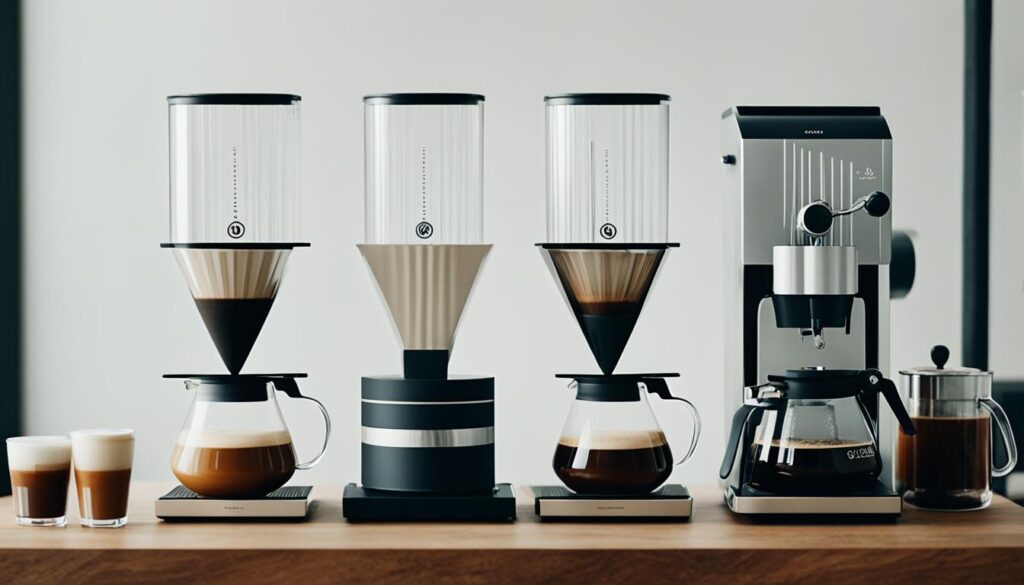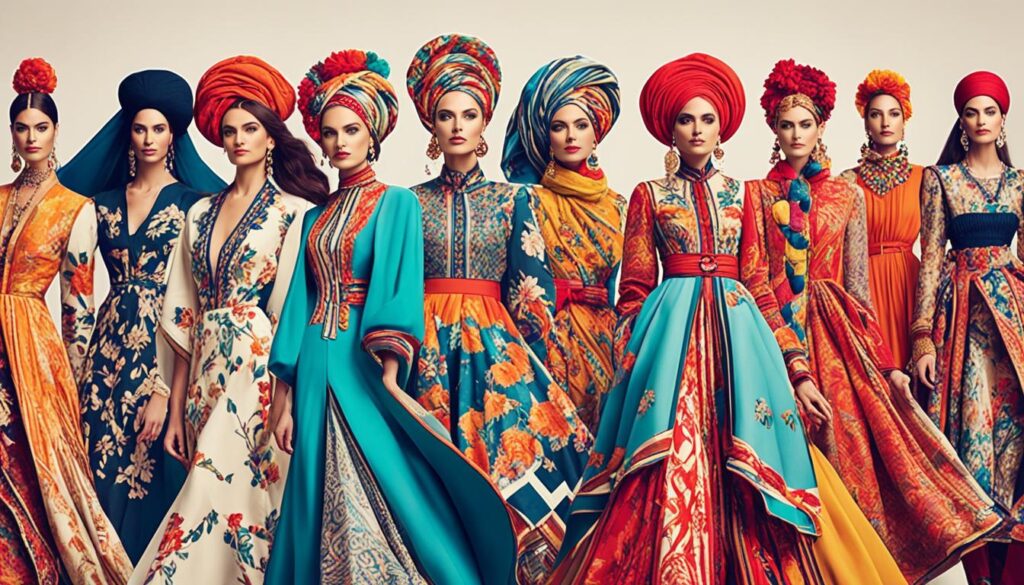Coffee has become an integral part of our daily lives, from our morning rituals to high-powered business meetings. But what truly defines a “good” coffee? Let’s explore the journey of coffee culture, from its rich history to the process of production and consumption.
Coffee has a long and captivating history that spans continents and centuries. From its discovery in Ethiopia to its global spread through trade and colonization, coffee has woven itself into the fabric of societies worldwide. Today, it is a symbol of energy, comfort, and connection.
Key Takeaways:
- Coffee culture is deeply rooted in history and tradition.
- The process of coffee production involves several stages, from growing the beans to brewing the perfect cup.
- Coffee consumption varies across cultures, reflecting unique brewing methods and rituals.
- Coffee brings people together and fosters meaningful connections.
- Understanding the journey of coffee from bean to cup enhances our appreciation for this beloved beverage.
The Historical Footsteps of Coffee
Coffee has a fascinating history, starting with its serendipitous discovery in Ethiopia and eventually making its way to becoming a symbol of European sophistication and American innovation. The discovery of coffee is believed to have originated in the 9th century, when a goat herder named Kaldi noticed his goats becoming more energetic after eating the red cherries of a certain plant.
Word of this magical fruit spread, and by the 15th century, coffee had reached the Arabian Peninsula, where it was cultivated and traded extensively. Coffee houses began popping up in cities like Mecca and Cairo, becoming vibrant centers of intellectual conversation and socializing.
During the Age of Exploration, European powers like the Dutch and the British made significant contributions to the coffee industry, establishing colonies in regions suitable for coffee cultivation and pioneering methods of coffee production.
“A cup of coffee shared with a friend is happiness tasted and time well spent.” – Unknown
The industrial revolution further revolutionized the coffee industry, with machinery making it easier to process and transport coffee beans on a large scale. This led to increased global demand and the rise of coffee as a commodity, shaping economies and cultural exchanges around the world.
Today, the coffee industry is a thriving global market, with specialty coffee gaining immense popularity. Specialty coffee refers to beans that are carefully cultivated and have unique flavor profiles, creating a premium coffee experience.
The Specialty Coffee Market
Specialty coffee offers a diverse range of flavors and experiences that appeal to coffee connoisseurs and enthusiasts. This segment of the coffee industry focuses on quality, sustainability, and ethical sourcing.
Through meticulous attention to growing conditions, harvesting methods, and roasting techniques, specialty coffee producers create a beverage with distinct taste notes and aromas. This level of craftsmanship has elevated coffee to an art form, akin to fine wines.
Specialty coffee has also sparked a culture of appreciation and education, with coffee cupping events, latte art competitions, and specialty coffee shops becoming hubs for coffee enthusiasts to connect and explore the world of coffee together.
With its rich history and continuous innovation, the coffee industry remains an integral part of our lives, providing us with daily rituals and moments of joy. Let’s journey deeper into the world of coffee culture, exploring the subjective nature of taste in the next section.

The Subjectivity of Taste in Coffee
The taste, preparation, and consumption of coffee are deeply influenced by the diverse brewing methods, roasting processes, and evolving trends. Each culture and region boasts its own unique approach, resulting in a myriad of flavors and experiences for coffee enthusiasts worldwide.
One fascinating example is Vietnam’s egg coffee, a creamy concoction made with egg yolks and condensed milk. This unique brewing method creates a rich and velvety texture, offering a delightful combination of sweet and savory flavors.
In contrast, Nordic countries embrace a minimalist approach to coffee. Influenced by their commitment to simplicity and sustainability, they prioritize single-origin, lightly roasted beans and focus on highlighting the natural characteristics of the coffee without overwhelming it with additives or intricate brewing methods.
As coffee enthusiasts continuously seek new experiences, trends within the coffee industry have a significant impact on how we drink and enjoy this beloved beverage. From the rise of specialty coffee to the growing popularity of alternative brewing methods like pour-over and cold brew, coffee trends both reflect and shape our evolving taste preferences.
“Coffee trends are like a window into the ever-changing desires of coffee lovers. They offer a glimpse of emerging flavors, brewing techniques, and experiential coffee rituals.”
Exploring Brewing Methods and Roasting Process in Coffee
The brewing method and roasting process significantly influence the final taste of coffee. Let’s take a closer look at some popular brewing methods and their impact:
| Brewing Method | Process | Taste Profile |
|---|---|---|
| Pour-Over | Hot water slowly poured over ground coffee in a filter | Delicate, clean, and nuanced flavors |
| French Press | Coffee steeped in hot water, then pressed down to separate the grounds | Full-bodied, rich, and robust flavors |
| Espresso | High-pressure water forced through finely ground coffee | Intense, concentrated flavors with a velvety crema |
The roasting process also plays a crucial role in coffee flavor development. Lighter roasts typically highlight the intrinsic flavors of the bean, showcasing fruity and floral notes. On the other hand, darker roasts tend to have bolder, smoky flavors.
Coffee Trends in the Modern Era
The world of coffee is ever-evolving, shaped by the changing preferences and evolving palates of coffee enthusiasts. Let’s explore some current coffee trends:
- Nitro Cold Brew: Infusing nitrogen into cold brew coffee creates a silky-smooth texture and adds a creamy element to the taste.
- Single-Origin Coffee: Coffee lovers are increasingly seeking beans sourced from specific regions to explore unique flavor profiles and support sustainable farming practices.
- Alternative Milk Options: With the growing popularity of plant-based diets, alternative milk options such as oat milk, almond milk, and soy milk have become mainstream choices for coffee lovers.
By embracing these trends, coffee enthusiasts can elevate their coffee experience and engage with the evolving world of flavors and brewing techniques.

A Global Affair: Coffee’s Journey Around the World
Coffee has transcended borders and become a global phenomenon.
Each country and community has embraced coffee in their own way, creating unique coffee cultures and traditions. From the Turkish coffee ceremony to South Korea’s thriving cafe culture, coffee has become more than just a drink – it’s a way of life and a means for social bonding.
“Coffee is a worldwide language, bringing people together through shared experiences and traditions.”
Let’s take a closer look at some fascinating coffee cultures from around the world:
Coffee Culture in Turkey
The Turkish coffee ceremony is an integral part of Turkish culture. The brewing process involves boiling finely ground coffee with water and sugar in a special pot called a cezve. This strong and flavorful coffee is traditionally served in small cups alongside a glass of water and Turkish delight.
Coffee Culture in Italy
Italy is renowned for its espresso culture. Italian espresso is brewed by forcing hot water through finely ground coffee under high pressure, resulting in a small, concentrated shot of coffee. Italians typically enjoy their espresso standing up at a coffee bar, quickly sipping it for a burst of energy.
Coffee Culture in Colombia
Colombia is famous for its high-quality Arabica coffee beans. Coffee production is deeply ingrained in Colombian culture, with coffee farms dotting the lush landscapes. The traditional Colombian coffee is brewed using a “cafetera,” a stovetop coffee maker that produces a smooth and rich cup of coffee.
Coffee Culture in Japan
With its meticulous attention to detail, Japan’s coffee culture is all about precision and perfection. Japanese coffee brewing methods, such as the pour-over method using a Hario V60 dripper, emphasize flawlessly extracting the flavors from the coffee beans. The Japanese also appreciate the aesthetics of coffee, often serving it in beautifully designed cups.
Coffee Culture in Ethiopia
Ethiopia is the birthplace of coffee, and its rich coffee heritage is deeply rooted in the country’s history. The traditional Ethiopian coffee ceremony is a time-consuming process that involves roasting, grinding, and brewing coffee beans in a clay pot called a “jebena.” The ceremony is a symbol of hospitality and communal bonding.
These are just a few examples of the diverse coffee cultures found across the globe. From Europe to Asia, Africa to the Americas, coffee continues to connect people and shape cultural identities. The beauty of coffee lies not only in its taste but also in the stories, rituals, and traditions that accompany it.
| Country | Distinct Coffee Culture |
|---|---|
| Turkey | Turkish coffee ceremony |
| Italy | Espresso culture |
| Colombia | Arabica coffee farms |
| Japan | Precision brewing methods |
| Ethiopia | Traditional coffee ceremonies |
When do We Crave Coffee? Exploring the Times and Reasons
Coffee has evolved alongside human society, serving different purposes at different times. From its use by Ethiopian monks during nocturnal vigils to becoming a social lubricant in 17th-century European coffeehouses, coffee’s consumption has adapted to fit changing eras and social constructs. Today, it continues to be a part of our daily routines, providing us with both energy and moments of relaxation.
Throughout history, coffee has been intertwined with various rituals and habits, shaping our cultural practices and personal preferences. Whether it’s the comforting morning cup that kickstarts our day or the mid-afternoon pick-me-up, coffee has become an indispensable part of our lives.
“Coffee is the common man’s gold and like gold, it brings to every person the feeling of luxury and nobility.” – Sheikh Abd-al-Kadir, Moroccan Sufi Mystic
- Coffee Rituals: From the ancient Japanese tea ceremony to the Italian espresso culture, coffee rituals offer a sense of tradition and contemplation. These rituals often involve specific brewing methods, precise measurements, and dedicated equipment. They allow us to appreciate the artistry and craftsmanship behind each cup of coffee.
- Coffee Habits: Our coffee habits are deeply ingrained in our daily routines and personal preferences. Whether we enjoy a freshly brewed pot at home or rely on our favorite coffee shop for our caffeine fix, our habits reflect our individual tastes and lifestyle choices.
But coffee consumption is not just limited to the morning or the act of drinking alone. It has also become a social activity, bringing people together for conversations, meetings, and shared experiences.
So, the next time you reach for a cup of coffee, take a moment to appreciate the rich history, diverse rituals, and personal habits that surround this beloved beverage. Let the aroma and taste transport you to the thriving coffee cultures around the world.
Conclusion
The world of coffee is a vibrant tapestry, woven with the threads of history, culture, and innovation. From the humble coffee bean to the meticulously crafted cup, coffee culture has captured the hearts and palates of people around the globe.
As we sip on our morning brew or gather with friends at our favorite cafes, we engage in a timeless tradition that brings us closer together. Coffee has the power to transcend borders and spark conversations, creating connections that bridge gaps and foster understanding.
Whether you prefer a delicate pour-over or a rich espresso, each sip tells a story. From the lush coffee farms of Ethiopia to the bustling coffeehouses of Europe, the journey of coffee beans is a testament to the dedication and skill of coffee producers everywhere.
So let’s raise our mugs and celebrate the diverse tapestry of coffee culture. As we embark on this flavorful journey, from bean to cup, let’s continue to explore, savor, and appreciate the rich flavors and the moments of connection that coffee brings to our lives.
















